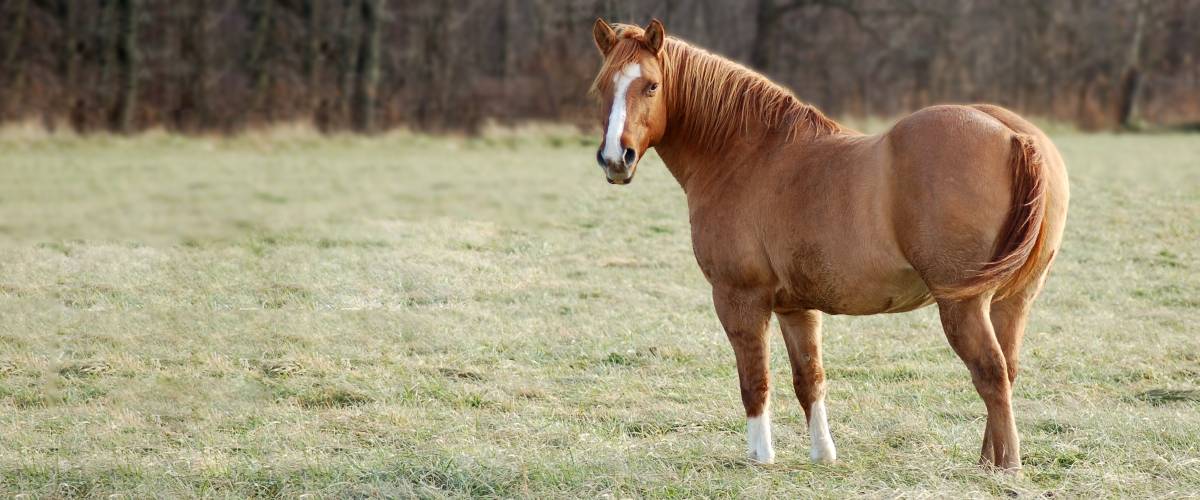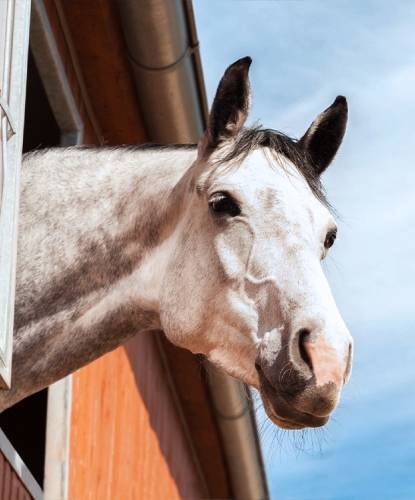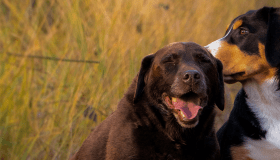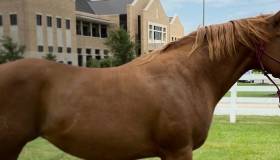
January 21, 2021 – Obesity is a growing problem in horses and ponies around the world, with an estimated 30% of horses estimated to be obese. And that extra weight comes with an increased risk of a host of health conditions, including equine metabolic syndrome, laminitis and orthopedic disease.
One reason for the upward trend is a shift in owners’ perceptions of what constitutes a normal body weight for their horse or pony. Studies show we’re getting used to seeing more overweight animals and this visual is becoming our new normal. What can we do about it?
Here are a few tips to help owners keep their horses and ponies lean and healthy:
Learn About Body Condition Scoring
Obesity prevention is far easier than weight loss, and one of the more useful tools to maintain a healthy weight is body condition scoring.
Body condition scoring should be a routine part of health monitoring in horses, and many different scoring systems are available. Most scoring systems have owners examine several key areas of the animal’s body for extra fat, including the neck, behind the shoulders, withers (base of the neck above the shoulders), ribs, back and tail head. Work with your veterinarian on a scoring system so you can recognize when your horse or pony is starting to put on weight. With that awareness, you can immediately start on appropriate management and feeding before the animal becomes obese, avoiding many weight-associated health risks.
Do the Diet Math
Just like people, horses and ponies can vary in their nutritional needs from one individual to another. Even when we think we are restricting their food, horses and ponies may be eating more than we think.
Historically, horses and ponies evolved to lose weight in the winter, due to fewer food sources and energy utilization to stay warm. Today, we provide them with a robust diet throughout the seasons, stable them out of the elements, and cover them efficiently with blankets in cold weather. In caring for them, we also have taken away some of the variables that historically would have helped kept their weight in check.
Work with your veterinarian to adjust diets for changing energy needs throughout the year. A stabled, blanketed horse doesn’t need the same diet as a horse out in pasture during the winter.
Feed Little and Often
The digestive tracts of horses and ponies necessitate a different feeding routine, as compared to other companion animals. For example, the horse’s stomach comprises only 9% of the gastrointestinal tract whereas in the dog it’s about 60%. That’s because horses and ponies evolved to eat almost constantly. They eat a bit, move, eat a bit more, and move some more. Because of this pattern, their gastrointestinal tracts evolved to process small, frequent eating. If you feed your horse larger, infrequent meals, their gut cannot process it efficiently. It might leave your horse wanting more food or worse yet, lead to major stomach and intestinal problems.
Have an Exercise Strategy
How much exercise is enough? Even if you regularly exercise your horse or pony, it doesn’t hurt to consult with an equine professional to make sure you have an optimal exercise regimen tailored for your individual animal.
Consult with your veterinarian before starting any exercise regimen with your horse or pony as part of their weight management plan. A daily walk instead of a brisk ride is a great start for an obese animal. Just like when we try to lose weight, it’s important to recognize that extra pounds put extra pressure on the joints – a potentially serious situation for all equids that may set them up for injury. Slow and steady wins the exercise battle.
Work with a Veterinary Nutritionist
Every animal is unique and may have specific health risks. A veterinary nutritionist can help tailor diet plans for your animal’s specific needs. Sometimes small changes, like an exclusion grazing muzzle or strip grazing will help; other times a complete overhaul of their diet is warranted. If your horse needs to lose weight, a veterinary nutritionist can make sure they are still getting the nutrients they need for optimal health.
Once your horse has achieved an ideal weight, continue to monitor their success with body condition scoring. Helping a horse or pony lose weight requires dedication and persistence, but it will do wonders for their overall health and quality of life.
More Resources
To learn more about obesity in horses, listen to our Fresh Scoop podcast featuring Dr. Patricia Harris, specialist in veterinary and comparative nutrition. In this episode, Dr. Harris discusses the equine obesity epidemic and how to determine a horse’s body condition. Dr. Harris also offers advice for owners on how to help their horse lose weight, as well as strategies to prevent obesity.

Want to Learn More About the Health of Horses & Other Species?
Be the first at the stables to hear about breakthroughs in equine medicine. Sign up today to receive AnimalNEWS and other Foundation updates.




